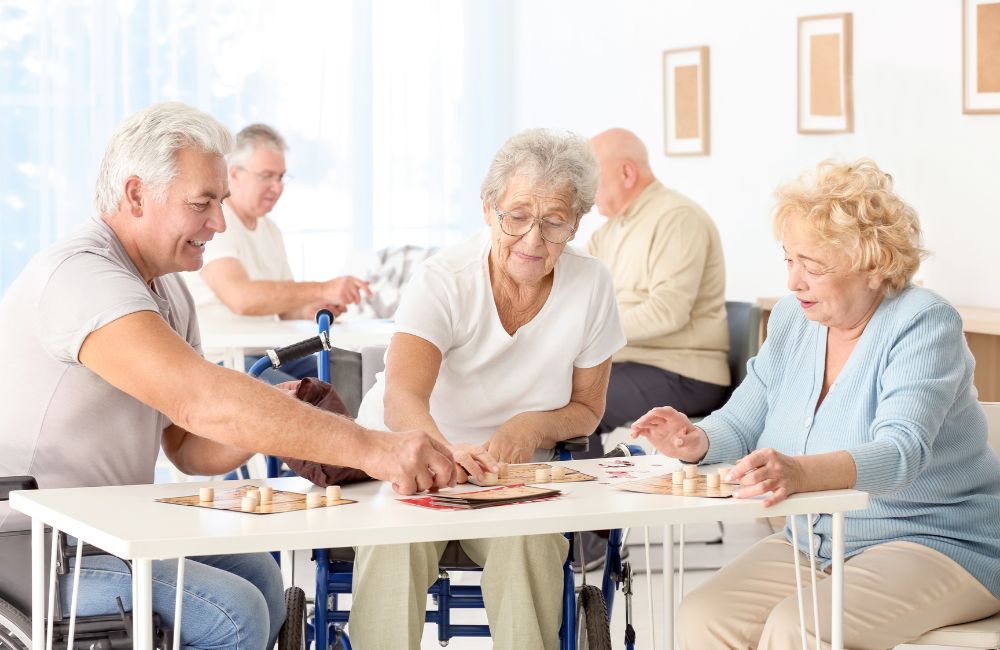Caring for a loved one with dementia can be a challenging and emotional journey. But amid the difficult stages and transitions, meaningful activities can provide boosts of joy, connection, and a sense of accomplishment for both patients and their caregivers. In this comprehensive guide, we will explore various forms of engagement that have been proven to enhance the quality of life for individuals living with dementia.
Understanding Dementia
Before we venture into the world of engaging activities, it's essential to gain a clear understanding of dementia. Dementia is not a specific disease but an umbrella term used to describe a range of conditions characterized by a decline in cognitive functioning severe enough to interfere with daily life. Alzheimer's disease is the most common cause of dementia, accounting for 60-80% of cases worldwide, followed by vascular dementia, which occurs after a stroke. Less common types include Lewy body dementia and frontotemporal dementia.
The Importance of Activities for Dementia Patients
Engaging in the right activities can offer various benefits for those with dementia. From reducing agitation and anxiety to improving mood and quality of sleep, the positive effects are numerous. Participating in activities can also help maintain motor and cognitive functions, delay the progress of symptoms, and foster a sense of belonging and purpose.
Physical Activities to Boost Health and Well-being
Physical activity remains crucial for overall health, even for those in advanced stages of dementia. Simple routines can significantly improve physical strength, balance, and coordination. Here are some physical engagement tips for different stages of the condition.
Simple Exercise Routines
Daily exercise, tailored to the patient's abilities, is an excellent way to keep their body active and healthy. This can range from chair yoga and stretching to light aerobics. Always be sure that exercise is supervised and safe for your loved one's physical condition.
Benefits of Physical Exercise:
- Improves cardiovascular health
- Enhances mood and overall well-being
- Promotes better sleep patterns
- Reduces the risk of falls
Outdoor Activities
Nature walks, when secure, or spending time in a garden can provide a serene and stimulating environment for patients with dementia. Fresh air, natural light, and the sounds of the outdoors can be invigorating and calming.
Tips for Safe Outdoor Activities:
- Choose familiar areas to reduce the risk of disorientation
- Ensure the weather is suitable
- Use nature as a conversation starter and sensory experience
Music and Dance
The power of music and movement for those with dementia is well-documented. Whether it's listening to a favorite tune or engaging in a gentle dance, these activities can unlock memories and evoke positive emotions.
Creating Musical Moments:
- Compile a playlist that includes the patient's favorite songs
- Sing along and encourage gentle movements
- Use instruments or soundboards to interact with the music
Cognitive Stimulating Activities
Cogitative engagements can help maintain mental acuity and promote a sense of intellectual satisfaction. Stimulating the mind with puzzles, conversations, and creative pursuits is a pivotal aspect of dementia care.
Memory Games and Puzzles
Games and puzzles designed for memory and concentration, such as card matching or jigsaw puzzles with large, easy-to-handle pieces, can be both enjoyable and beneficial for cognitive function.
Choosing Appropriate Games:
- Start with simpler versions and gradually increase the challenge level
- Focus on games the patient enjoyed before the onset of dementia
- Ensure the environment is quiet to allow for concentration
Reading and Storytelling
Engaging the mind through reading books, magazines, or listening to stories can open up new avenues for communication and shared experiences.
Tips for Encouraging Reading:
- Choose material that aligns with the patient's interests
- Read together and pause to discuss the content
- Use pictures to enhance understanding and recall
Art and Craft Projects
Getting creative can be a source of great joy and self-expression. Art projects like painting, drawing, and crafting tap into the patient's emotions and can act as a means to communicate when words fail.
Crafting Together:
- Utilize materials that are safe and easy to handle
- Offer plenty of encouragement and praise
- Keep the focus on the process, not the end product
Social Activities to Encourage Interaction
Maintaining social connections is key to combating feelings of loneliness and isolation. Encouraging interactions through group activities, visits, and community involvement can provide the shared joy of companionship.
Group Games and Events
Participating in games or events with family or other patients can foster a sense of community and accomplishment.
Game Night Suggestions:
- Play bingo, charades, or simple board games
- Organize a movie night with popcorn and shared memories
- Host an informal talent show with music and storytelling
Family Visits and Social Gatherings
Spending time with loved ones, sharing stories, and creating new memories can be heartwarming and fulfilling.
Making the Most of Family Time:
- Plan visits when the patient is most alert and rested
- Create a comfortable and familiar space for gatherings
- Focus on the enjoyment of being together rather than complex activities
Community Service Projects
Involvement in community service can give patients a sense of purpose and a way to give back. Preparing care packages or participating in charitable activities can be rewarding for all involved.
Suggested Service Activities:
- Knitting blankets or crafting items for donation
- Sorting donations at a local food bank
- Contributing to community beautification projects
Sensory Stimulation for Emotional Comfort
Activities that stimulate the senses can be profoundly soothing and calming for those with dementia. Providing sensory-rich experiences, such as aromatherapy or listening to the sounds of nature, can help create a therapeutic environment.
Aromatherapy and Massage
The power of touch and scent in promoting relaxation and reducing stress cannot be understated. Aromatherapy sessions and gentle massages can be incredibly calming.
Using Aromas for Comfort:
- Be sensitive to scents the patient enjoys or may find calming
- Use diffusers or natural oils for a subtle, even distribution
- Combine smells with familiar music or images for deeper relaxation
Pet Therapy
Interactions with animals can be immensely therapeutic, offering unconditional love and a comforting presence.
Incorporating Pets into Care:
- Ensure the presence of pets is safe and controlled
- Encourage gentle interactions and bonding moments
- Supervise interactions to avoid overstimulation or stress
Gardening and Nature Walks
Engaging with the Earth and the natural cycles of life can be a grounding and calming experience.
Gardening Tips for Dementia Patients:
- Provide easy-to-manage tools and plants
- Create spaces for sitting and enjoying the garden
- Focus on sensory-rich plants that offer various textures and scents
Adapting Activities to Individual Needs
It's important to customize activities to the individual's preferences, current abilities, and history. By recognizing what a patient enjoys and can still manage, caregivers can ensure activities are as enriching as possible.
Personalizing Activities Based on Patient History
Incorporating familiar activities and interests from the patient's past can bring forth a sense of identity and joy.
Recalling Past Interests:
- Talk to family members to gather insights into past hobbies
- Look through photo albums or personal mementos for inspiration
- Use past professions or life events as themes for activities
Safety and Comfort Measures
Creating a safe and supportive environment for activities is paramount. This involves proper supervision, managing the duration and pace of activities, and ensuring the patient's comfort.
Best Practices for Activity Safety:
- Eliminate tripping hazards and keep pathways clear
- Ensure all tools and materials are safe and easy to handle
- Regularly check in on the patient's comfort and physical well-being
Using Technology to Facilitate Activities
Technology can be a valuable tool in providing engagement and stimulation. From digital memory games to video calls with friends, the possibilities are extensive.
Integrating Technology:
- Explore apps and games designed for dementia patients
- Use video calls for social interactions and virtual tours
- Set up simple audio-visual systems for music and reading
Practical Tips for Caregivers
For those tending to a loved one with dementia, understanding how to best approach and support activities is crucial. Effective communication, handling challenging behaviors, and recognizing signs of enjoyment are key areas to focus on.
Effective Communication Techniques
Communication with dementia patients often requires patience and creativity. Learning to listen, use non-verbal cues, and speak clearly and calmly can make interactions more successful.
Communicating with Compassion:
- Maintain eye contact and speak face-to-face
- Use simplified language and offer choices when possible
- Pay attention to non-verbal responses and adapt accordingly
Handling Challenging Behaviors
Changes in behavior are common throughout the progression of dementia. Developing strategies to de-escalate conflicts and manage distress is an essential skill for caregivers.
Managing Behavioral Challenges:
- Identify potential triggers for agitation and avoid them
- Offer reassurance and a calming presence
- Use redirection or simple tasks to shift the focus
Recognizing Signs of Enjoyment and Discomfort
The ability to interpret a patient's reactions can enhance the activity experience. Knowing when to continue or modify an activity ensures the best engagement.
Observing Reactions:
- Be attentive to body language and facial expressions
- Note verbal cues even if they are non-literal
- Engage in a feedback loop by offering choices and observing responses
Empowering Patients and Caregivers
Engaging in activities with loved ones dealing with dementia is more than just a pastime—it's a meaningful way to connect and find joy in shared experiences. By offering a range of stimuli, support, and understanding, caregivers can provide a rich and fulfilling life for their patients, full of cherished moments and continued growth.
For additional resources and support, a wealth of trusted organizations is available to provide further guidance. Remember, the most effective activities are those crafted with love, tailored to the unique person they're for. By investing time and thought into the engagement process, caregivers can truly make a difference in the lives of dementia patients.
For those seeking further information and resources on managing dementia care, the following organizations offer invaluable guidance and support:
- National Institute on Aging - Alzheimer's and Related Dementias: Provides comprehensive research-based information on Alzheimer's and related dementias.
- CDC - Alzheimer's Disease and Healthy Aging: Offers insights and tips on Alzheimer's disease and promoting healthy aging.
- Administration for Community Living: Committed to enhancing the living quality for people with Alzheimer's and their caregivers through various resources and support services.
These resources can be a vital part of a caregiver’s toolkit, offering strategies, educational materials, and support for those navigating the complexities of dementia care.
Give us a call today to learn how we can support you in providing the best care possible for your loved one. Remember, you are not alone on this journey and by finding joy in shared experiences with your loved one, you can create lasting memories and make a positive impact on their life.










